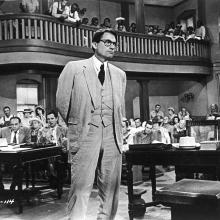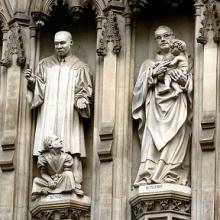heroes
I wish that we, as a people, would speak better words to those who have served in our wars. I fear that we do them, and ourselves, a disservice when we call them all heroes without letting them decide which deeds were heroic and which should be left unspoken. When we call everyone who wears a uniform a hero, we diminish heroism everywhere.
I don’t mean we should refrain from thanking those who serve. If anything, we should thank them far more than we do, and our thanks should not just be in words. Our thanks should be sincere and long-lasting, and expressed in things like the best military hospitals we can afford, the best education we can provide, and our best efforts to ensure that their generation will be the last to endure what they have endured. Even if those ideals prove to be unattainable, we should not let that stop us from trying to attain them. As the Talmud says, “It is not your job to finish the work, but you are not free to walk away from it.”
IN HER JEWISH school in Montreal, Ronit Avni learned the tragic history of her people. Her Canadian mother and Israeli father had met in the ’60s when her mother was living in Israel and working as a folk singer, often performing for Israeli troops. Her older sister was born in Tel Aviv, but the family settled back in Montreal in the mid-’70s before Ronit was born.
Not strictly religious but committed to the values of Judaism, Ronit couldn’t help but ask probing questions as she listened to the stories of the birth of the modern state of Israel in 1948. Am I hearing the whole story? How do Palestinian perspectives differ from what my educators and community leaders are teaching? How can we transform this situation from a zero-sum equation to one that respects the dignity and freedom of all?
Years later, having graduated with honors from Vassar College with a degree in political science after studying theater at a conservatory in Montreal, Ronit trained human rights advocates worldwide to produce videos as tools for public education and grassroots mobilizing.
By the time I met Ronit a few years ago, she had narrowed her worldwide focus to the Israeli-Palestinian conflict, where her heart was most deeply drawn. She is the founder and executive director of Just Vision, an organization dedicated to increasing media coverage and support for Palestinian and Israeli efforts to end the occupation and conflict without weapons of violence.
During the last several years, my engagement in the Holy Land has been significantly shaped by Ronit. Her film Encounter Point, about Israelis and Palestinians who have lost family members, land, or liberty to the conflict yet choose forgiveness and reconciliation rather than revenge, gave me hope that peace can emerge from pain.
September 30 - October 6 was Banned Books Week, an annual event that celebrates the freedom to read.
Surprisingly, Harper Lee's novel To Kill A Mockingbird makes the list of frequently banned books.
To Kill A Mockingbird changed my life.
"You never really understand a person until you consider things from his point of view," says Harper Lee through Atticus, "until you climb into his skin and walk around in it."
How much have I learned as a teacher and a writer by thinking about every person I meet with that consideration?
The scandal du jour across the morning news shows today was Lance Armstrong's decision to stop fighting doping investigations. It means he is stripped of his record seven victories in the Tour de France and his bronze medal in the 2000 Olympics.
While saying uncle in the doping fight doesn't necessarily equal guilt, the presumption is that Armstrong knew things were going to come out in the investigation — that there was some evidence or testimony that would not look good.
Today on Morning Joe, I thought MSNBC contributor Jonathan Capehart hit the nail on the head:
"This is yet another institution that has failed. … We've seen everything that people believed in — whether it's the financial institution or government itself or just heroes — just falling by the wayside. You're seeing that this world that we have constructed of sort of purity and perfection, it's just not real."
"If you tell a lie, it will be all over the country in a day or two. But if you tell the truth, it will take ten years to get there." ~ Eddie "Son" House
And the truth is what Jesus offered the people of his hometown in this tale from Mark's Gospel. Jesus offered his prophetic witness of truth-telling. He held up a mirror and showed them who they were. He held up a mirror and said to them, "The Kingdom of God is with you."
They were enraged that one of their own would do such a thing.
He was utterly astonished that the people who had raised him were incapable of facing their own truth.
He also knew that if they could not face the realities of their own complicated lives they would not be able to embrace the healing and forgiveness that God offered.
Jesus had the blues. He had the hometown blues.
So, rejected, he fled his hometown.
Then he sent his apostles out into the world proclaiming peace, healing the sick and the lame, and prepared to face the same rejection. People don't like to be reminded of the complications of real life. None of us like the feeling of being judged when the mirror is held up before us.
Arizona won a significant victory last week when Russell Pearce, author of Senate Bill 1070, lost in a first-ever recall election.
It was not without great effort. I’ve since been reflecting on the lessons of the work and how we traveled from the darkness of SB1070 to the hope we feel today.
The Rev. Martin Luther King Jr. and Archbishop Oscar Romero are our heroes. They shared much in common: Both ultimately were focused on being obedient to God and his call on their lives and as such they were both, first, ministers of the Gospel. King and Romero were fixated on justice — in love with poor people and hurting communities. Both searched for middle ground while others stayed safe inside comfortable margins; both were agents of reconciliation.
And, finally, both were martyred for their message.
Yet Romero and King have a seeming discrepancy I want to explore.
Romero called us to take the long view; King discussed the fierce urgency of now.
Romero essentially prays: Trust God, be faithful. King preaches: now is the time, act forcefully.





